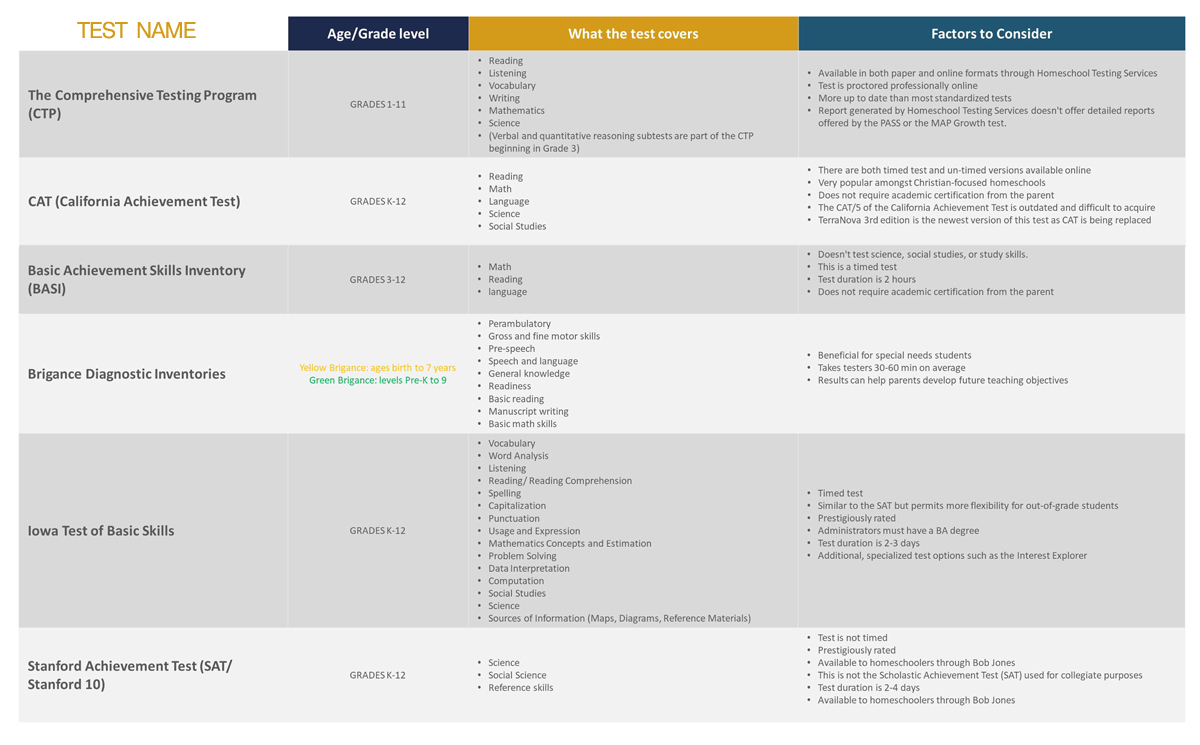Homeschooling allows parents and their children to create a unique curriculum that best suits their learning abilities and interests. Therefore, when it comes to standardized tests, many wonder if they’re even necessary for their homeschooled child, let alone which of the countless tests to take.
Before you choose a standardized test for your homeschoolers, research your state’s requirements. Some states will require these tests and might even state which specific test is necessary. If they aren’t required in your state, consider the pros and cons of standardized tests, and then compare your options to find which suits your child best.
For those of you considering standardized tests for your homeschooled child, read on for our complete guide on the subject. We’ll cover the various options available for standardized tests and discuss factors to determine if this is the right choice for you and your child and what to do with their test results.
Should Homeschoolers Take Standardized Tests?
There are two facets to this question of whether your homeschooled child should take standardized tests. The first being whether it is required of them, and the second being whether a standardized test is beneficial for your child at the current point in their education.
When it comes to standardized tests in the United States, it is not nationally required for all students, public, private, or homeschooled, to take them. However, there are some tests students are required to take on a state level if they are residents of:
- Arkansas
- Colorado
- Florida
- Georgia
- Hawaii
- Iowa
- Louisiana
- Maine
- Massachusetts
- Minnesota
- North Carolina
- North Dakota
The requirements within each state can vary significantly. Some states only require homeschooled children to take specified tests up to a certain grade level. The types of tests can also vary from standardized tests to achievement tests to parental evaluations.
The amount of parental freedom also differs by state. For instance, in Arkansas, students must take achievement tests selected by the state board of education, whereas Hawaii allows parents to choose the preferred standardized test for their child.
In the end, the question of whether they should take standardized tests might not be a choice. Your state of residency might require these tests and specify which test your child must take.
If you’re blessed to live in one of the 27 states that have no testing requirements for homeschooled children, then you get to muddle around on whether you think this form of testing is worthwhile.
What Are the Benefits of Standardized Tests?
The pros and cons of standardized tests are largely debated in the educational community, so it is important to determine if you, as a parent and educator, think the benefits outweigh the downsides in this situation.
There are several reasons why standardized tests can be advantageous for your child’s education, but it ultimately comes down to where they are in their educational journey. We advise you to consider the benefits listed below, but keep in mind that it is never helpful to set your child up for failure.
If you are certain your child is not at the point in their education where they have a fighting chance on a standardized test, it is best to hold off until they are ready, or offer the test for the grade below until you are confident enough in their knowledge to test them on what they have learned.
Helps Parents Evaluate Where Their Child Stands In Their Educational Journey
Most parents opt for homeschooling because they enjoy the freedom it gives them to educate their children in the manner they deem best and suits their needs and interests.
However, this means that homeschooling can come in many forms and models, including:
- The Classical Method
- The Charlotte Mason Method
- The Montessori Method
- Unschooling
- School-at-Home/ Traditional Homeschooling
- Eclectic homeschooling
With so many variations, each tailored to a unique child or children, it can be difficult to determine where your child stands in the grand scheme of their educational journey.
It’s true that not every child needs to grow up learning the same things as those in schools, but most parents and educators can agree on a set number of subjects and topics all children should have a basic understanding of to be successful in life. The ability to read and write as well as basic math are two examples.
Giving your child a standardized test can sometimes help you gain a more objective opinion on what information your child seems to grasp well and where they might be struggling. The tests might reveal that your child is on equal footing as other children their age who are in private or public schools, or it might allude that they are behind or even ahead in one or several areas of their education.
What the parent does with this information is ultimately up to them, but having it can be invaluable to tailoring your future lessons.
Familiarizes Children with Formal Testing
Tests are certainly difficult and stress-inducing for anyone, but the earlier a child is exposed to formal testing, the soon they’ll become familiar with them, and the less they’ll worry about being so formally evaluated.
Whether you intend to keep your child in homeschooling for the entirety of their education or just up to a certain grade or level, taking tests is unavoidable. True, not all tests are as extensive as standardized tests, but depending on your child’s path, they might have to take tests even harsher than these to pursue their future career.
For instance, any student interested in entering the medical field at a Masters’s or Graduate level will have to seriously consider taking the MCATs, and those interested in pursuing a law degree will almost certainly have to take the LSATs.
These tests are notoriously difficult and almost always required for students to be accepted into collegiate programs. Students that opt not to take them are at a severe disadvantage for acceptance.
If your child has never taken any form of standardized test before they are expected to take one of these testing behemoths, they will undoubtedly struggle.
Plus, testing isn’t just limited to education. There might be instances where your child is required to take some sort of test or evaluation for their career. Even food industry managers have to take tests like the ServSafe certification to prove they have been educated on proper food handling, storage, and potential hazards.
Again, the sooner your child is exposed to tests, both at home and standardized, the more prepared they will be for tests outside of homeschooling.
Participation Helps Tests and Schools Improve
This benefit might not be so much for you and your child specifically, but it’s an important factor to discuss, nonetheless.
Many parents, homeschoolers or otherwise, question the benefits and effectiveness of standardized tests due to the common criticisms we’ll discuss momentarily. Therefore, since homeschooling gives parents the option to refrain from giving their child a standardized test, if they live in the right state, they frequently will.
However, refraining from having your child take these tests doesn’t help them improve. Standardized tests don’t just help teachers and parents pinpoint their child’s educational strengths and weaknesses; it also helps the schools and the test creators see what needs to be improved for the benefit of all students.
If students nationwide consistently struggle with a particular section, structure, or individual question, the test can analyze why this is happening and how they can improve to set students up for success in the future.
Additionally, many parents opt for homeschooling over placing their children in schools because they don’t believe the school curriculum is structured for each student’s benefit. Taking standardized tests helps schools change their curriculum and ways of teaching to help their students succeed.
The tests come from independent organizations rendering them neutral sources when it comes to results. Schools can compare the results of their students to those of schools in their immediate region, state, and even nationwide determine what they’re doing well and what needs to be improved.
It’s okay to not want your children in public schools because you don’t believe they are a good fit for your child, but if the issue is their teaching abilities, then refraining from participating in standardized tests doesn’t help schools solve this issue.
Are There Arguments Against Standardized Testing?
Now that we’ve detailed the benefits of standardized tests, we can discuss some of the main criticisms and drawbacks of this form of testing that might lead you to refrain from subjecting your child to them.
The Test Rarely Reflects What Your Child Truly Knows
The biggest argument against standardized tests is that they aren’t an accurate way to determine what information a student knows.
There are certain things you can pinpoint for your child’s results that can help you ascertain if they are truly grasping a concept or not. For instance, if you see that your child consistently struggled with certain math questions or if the essay they wrote is extremely disorganized, you know what you can work on with them in the future.
That being said, standardized tests simply aren’t suited to every individual, and those who aren’t strong test-takers will inevitably struggle more than those who excel with timed, written tests. In a way, they don’t test what the student knows about how quickly they can recall this information.
Not only do standardized tests cater to a particular type of learner and test-taker, but there is an enormous number of factors that could affect a student’s score that had absolutely nothing to do with what they know. Realistically, it could all just come down to how they felt that particular day.
Maybe they only slept for four hours the night before the test. Maybe they were ill that day and just not feeling well enough for such a lengthy mental challenge. Maybe the stress and anxiety caused by the test alone made it too difficult for them to focus. The list is endless.
But you don’t see those factors when the test results are printed; you just see what they got right and wrong.
Using Standardized Tests Can Alter Teaching Styles
This drawback is a significant pitfall for schools and could easily pose an issue for any homeschool parent giving their child a standardized test.
Because there is so much information in standardized tests that students need to learn beforehand for the optimal score, teachers will frequently fall into the trap of “teaching the test;” meaning all of the course content is specifically tailored towards what will be on the required standardized tests versus what the teacher thinks the students should know or best suits their interests. This is called outcome based education.
If you are strongly considering giving your child a standardized test, try to keep in mind that the beauty of homeschooling is the freedom to teach your child what you deem useful and what they want to know.
Don’t base your teaching style and curriculum around this test that may or may not have any true benefits to your child’s education.
The Testing Process and Results Can Be Emotionally and Mentally Detrimental
Anyone who has taken a test knows how stressful the process can be, even before you’re sitting down in front of it.
Our society as a whole puts excessive emphasis on tests, especially standardized tests like the SATs or ACTs. The immense pressure to perform on these tests could easily drive students to their mental and emotional limits.
Months of preparation go into these tests, and that level of stress and anxiety doesn’t even end after it’s taken.
Once the test is over, students have to wait for their results that typically come online or in the mail weeks later. During that time, they could agonize over how the test went, what they assume they got wrong, and what it would mean to receive poor results.
Of course, after they’ve received their results, various circumstances could occur. If they performed well, it was all worth it in their mind (even though no test result is worth such turmoil), but if they performed poorly, their self-confidence is severely damaged, which could lead to a series of doubts about their abilities.
All of this over a test that isn’t tailored towards them and probably won’t affect their life very much ten years down the line.
When Should Homeschooled Students Take Standardized Tests?
If you’ve decided the pros of standardized tests outweigh the cons, then the next step is to look into how frequently your child should take these tests and which of the many standardized tests are best.
The answer to when or how often your homeschooled child should take standardized tests heavily depends on their state of residency. Just like certain states will or won’t require these tests, those with specified criteria of when students should be tested are in place.
The most common standard is for students to take standardized tests every other year of their education, starting at grade three and ending in grade eleven. Some states will have variations of this rule, while others require annual evaluations from the parents.
If your state doesn’t have any requirements for standardized testing, you’re free to have your child take them as frequently or infrequently as you please.
It’s typically recommended that you test and assess your child’s progress, if not annually, then every other year just to see how they’re coming along with their education. The key here is to see the standardized tests as a tool to gauge your child’s comprehension and progress rather than a grade or score based on their intelligence.
Can Anyone Get a Standardized Test?
Although standardized tests are a feasible option for any homeschooled student, you can’t always just buy one off the internet and have your child take the test on the living room couch.
Some criteria have to be met before you can administer certain standardized tests, and sometimes, they have to be taken in specified settings.
Where and how a homeschooled student can take a standardized test largely depends on what test they are taking and who is administering it. The most significant criteria for these tests, in most cases, is that they must be supplied and proctored by someone with a teacher’s certification or a four-year degree.
If you have these certifications, you’re free to order some of the tests and administer them at home. However, if you don’t have either of these certifications, you can pursue a Test Administrator certification through Bob Jones, which will allow you to give your child the Stanford-10 Achievement Test.
Unfortunately, if you were hoping for an option that doesn’t require additional schooling past the GRE, we don’t have great news for you. Each of these certifications requires four years of schooling or an official Bachelor’s degree, so be sure to keep that in mind when you officially decide to start homeschooling your child.
There are certainly some tests that have no credential requirements, like the BASI, but this isn’t always the case, so being certified certainly gives you more options in this regard.
What Standardized Tests Should Homeschoolers Take?
Sometimes the most difficult question to answer regarding standardized tests is which one should your child take? There are a significant number of standardized tests, and choosing the right one that best suits your child can be a great first step to ensuring their success.
Sometimes, your state will require your child to take whatever standardized test is offered in the schools of your residency’s district. However, if this doesn’t apply to you, it’s good to know what options are available to you and your child.
Here are the most common standardized test options chosen by schools and homeschool parents nationwide. Each has its own benefits, downfalls, and specified age ranges, so be sure to take them all into account before deciding.
Although this chart might seem comprehensive, there are a vast number of additional standardized tests your child can or might have to take.
Remember to consider the pros and cons of each before making an official choice. For instance, if you know your child struggles with timed tests, opt for a timeless option, so they have all the time they need to be successful.
Simple choices like this can significantly impact your child’s perception of standardized tests and their results.
How to Review Standardized Test Results
What’s arguably more important than the standardized test itself is what you do with your child’s results as a parent and an educator.
There are two factors to consider here, what you’ll do with the information you’ve received, and how you’ll react and discuss this information with your child.
What to Do with the Results
We’ve mentioned this before, but it is vital that, when you have received your child’s standardized test results, you don’t see it as a number that reflects their intelligence but rather a tool for assessment and improvement.
As a parent and an educator, you already have a much more in-depth understanding of your child’s progress than this test will tell you. Where it comes in handy is providing you with a more objective opinion of what your child seems to be grasping well and where they might need extra attention.
Although there are certain factors that can affect your child’s results, it’s important to take your rose-colored glasses off when reading them. Every child is unique and special, but you shouldn’t let your love for your child affect how you read their results.
If it’s clear that they struggled significantly on a particular section, this is a clear red flag that they need help here. Don’t assume they would have performed perfectly here under other circumstances. Missing a question or two is understandable, but if there is a clear trend present in their results, it’s wise for the sake of your child’s education not to ignore it.
Another thing to keep in mind is that the results of these tests aren’t necessarily clear indicators of your child’s intelligence or your capabilities as a teacher. It is an opportunity for you both to improve. If they didn’t perform as well as you’d hoped, it doesn’t make them a bad student or you a bad teacher.
Try to determine what can be improved for future lessons and work hard with your child so the next test goes more smoothly. If you notice after three or more tests that their results are consistently low, this might indicate they are struggling more than you’re aware, and more drastic changes might be necessary.
How Your Reaction Matters
The results of standardized tests are exceptional tools, but how you present them to your child can have lasting effects on their self-confidence and opinions regarding these tests or even homeschooling in general.
Although we certainly can’t tell you how to parent and educate your child, we do have some key pieces of advice for those of you ready to discuss your child’s standardized test results with them.
The first piece of advice is not to over or under praise them. If you’re over the moon about their exceptional test scores, you could inadvertently set a high bar your child is afraid to not meet on future tests, leading to a great deal of anxiety and achievement complexes.
However, if you fail to praise them at all, or worse, you criticize them, you could take a significant toll on their self-confidence and perception of their personal intelligence. A balance between the two is key in this situation.
We also strongly advise that you use these test results as an opportunity for discussion with your child rather than a point of criticism or judgment.
Instead of asking them why they answered something incorrectly despite you covering it in lessons, ask them why they think they struggled with the question and if they know what it should have been. If they don’t get this, it is an opportunity for you to re-teach the material.
Before you even show your child their test results, discuss with them how the test felt. You could ask them where they felt they did well, where they struggled, what they like and disliked about the test, and so on.
This allows them to openly discuss how the test made them feel and gives you vital information that might help in the future. Perhaps the test was administered too early in the morning, and they were too tired to focus, or the fact that it was timed stressed them out too much.
They might even state that the test seemed to prioritize something they deemed unnecessary or wasn’t covered sufficiently in their studies, which will allow you to fill this hole in future lessons.
Final Thoughts
Although they certainly aren’t perfect, standardized tests are often an exceptional tool for homeschool parents that allows them to objectively determine what is going right with their child’s education, what can be improved, and where they stand on a regional and national scale.
They’re also opportunities to prepare and familiarize your child with formal testing that they’ll undoubtedly have to repeat at some point in their educational journey. High-stakes tests like the SAT, ACT, MCAT, and so on, not to mentioned job-related tests, are much easier when the student is already familiar with the common structures and evaluations of standardized tests beforehand.







